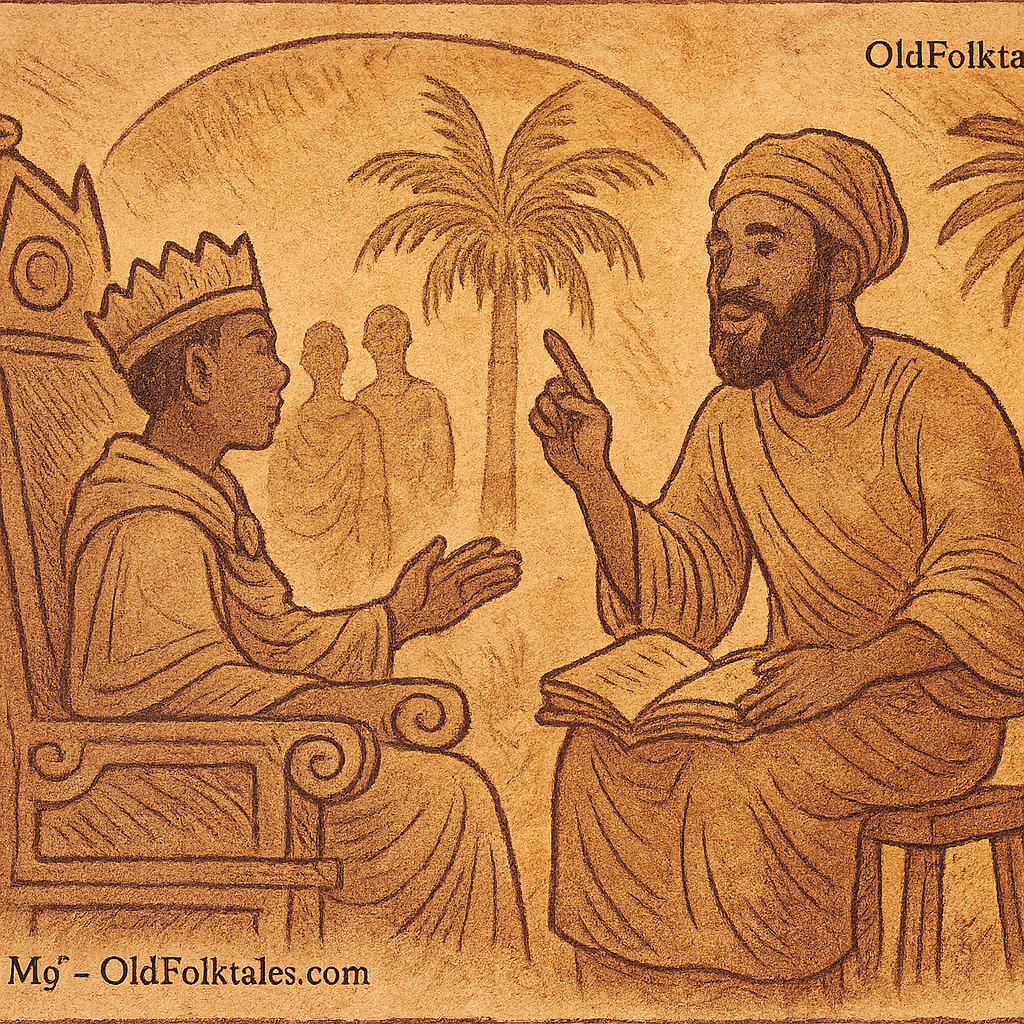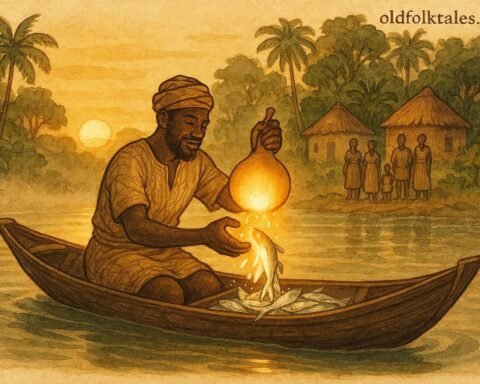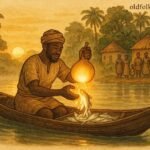In the ancient days when spirits still walked among mortals and the boundary between the seen and unseen worlds was thin as morning mist, a great chief of Ibadan made his daily rounds through his territory. The red earth paths wound through dense forests where mighty iroko trees stretched their branches toward the heavens, and the air hummed with the songs of countless birds and the whispers of ancestral spirits.
It was on one such morning, as golden sunlight filtered through the canopy of leaves, that the chief discovered something that would change his life forever. There, sitting alone at the forest’s edge like a small mushroom growing from the earth, was a boy of perhaps five years. The child’s clothes were simple and worn, his feet bare and dusty from wandering, but his eyes held a strange depth that seemed far older than his tender years.
The chief approached the boy with the careful steps of one accustomed to dealing with the mysterious ways of the forest spirits. His voice was gentle but commanding as he asked the question that hung in the morning air like incense: “Whose son are you, little one? Where is your family?”
Also read: Kokou the Scholar
The boy looked up at the towering figure of the chief, his small face serious and untroubled. With a simple shrug of his narrow shoulders, he replied in clear Yoruba, “Mi ò mọ̀” “I don’t know.”
The chief studied the child’s face, searching for any sign of fear or deception, but found only honest confusion mixed with an odd serenity. Something about the boy’s calm acceptance of his mysterious circumstances touched the chief’s heart. Perhaps it was the way the child sat so peacefully in a place where most would be terrified, or perhaps it was the gentle manner in which forest birds seemed to gather around him without fear.
“Then you shall be called Mi O Mọ̀,” the chief declared, his decision swift and sure. “And you shall come home with me as my own son.”
And so the mysterious boy became part of the chief’s household, growing up alongside the other children in the sprawling compound where the sounds of daily life created a constant symphony of voices, laughter, and activity. Yet even as he found his place in this loving family, Mi O Mọ̀ remained different from his adopted siblings in ways both subtle and profound.
While other children played typical games with carved wooden toys and competed in wrestling matches, Mi O Mọ̀ spent his hours chasing colorful birds through the compound, his bare feet silent on the swept earth as he followed their flight patterns with intense fascination. He would stand for long minutes speaking in soft whispers to the wind, as if carrying on conversations with invisible companions. The creatures of the bush seemed drawn to him like iron filings to a lodestone, lizards would bask fearlessly on his shoulders, and even the shy forest antelopes would approach when he sat quietly beneath the trees.
The years flowed by like water in the great rivers, and Mi O Mọ̀ grew from a mysterious child into a young man whose difference from others only became more pronounced. It was during one of his solitary wanderings through the abandoned farmsteads that dotted the outskirts of the settlement that he made a discovery that would prove fateful.
Hidden beneath layers of red earth and tangled roots, his fingers found the outline of something hard and metallic. With patient digging, he unearthed an old sword, its iron blade pitted with rust and its leather-wrapped handle cracked with age. To any observer, it appeared worthless, a relic better left buried. Yet when Mi O Mọ̀’s fingers closed around the handle, something electric seemed to pass between weapon and wielder. The sword felt alive in his grasp, as if ancient power slumbered within its corroded metal, waiting for the right moment to awaken.
Not long after this discovery, Mi O Mọ̀ encountered a mare that had become the laughingstock of every horse trader and warrior in the region. She was painfully thin, her ribs showing through dull coat, her gait hampered by a pronounced limp that made her seem more burden than blessing. People pointed and laughed when they saw her, shaking their heads at what they considered a worthless animal fit only for vultures.
But when Mi O Mọ̀ approached the mare and placed his gentle hand upon her neck, her eyes transformed before his very gaze. What had been dull and lifeless suddenly shone like moonlight dancing on a quiet river, and in that moment, he knew she was far more than she appeared to be.
Years continued to pass until the day that terrible news spread through the land like wildfire consuming dry grass. The beloved daughter of the great king of Oyo had vanished, carried away by a powerful forest spirit to the mysterious caves of Olumo Rock. The king’s grief was beyond measure, his rage at the spirit’s audacity burning hotter than a blacksmith’s forge.
Warrior after warrior attempted the rescue, each more confident than the last. They rode out on magnificent stallions, their bodies protected by the finest armor, their weapons forged by master smiths and blessed by the most powerful medicine men. Yet one by one, they returned defeated and shamefaced, or did not return at all.
In his desperation, the king made a proclamation that echoed through every village and compound: “Whoever can save my daughter from the spirit’s prison shall have her hand in marriage and be granted great honor in my kingdom.”
When Mi O Mọ̀ announced his intention to attempt the rescue, the laughter that erupted from the gathered crowd was like the cackling of hyenas. “How can a foundling boy with a rusted sword and a lame horse succeed where our greatest warriors have failed?” they jeered. “The forest spirit will crush him like an ant beneath a giant’s heel.”
But Mi O Mọ̀ mounted his unlikely mare with quiet confidence, the ancient sword secure at his side. As they began their journey toward the legendary caves of Olumo, something miraculous occurred. The mare’s voice rose like music in the morning air, speaking in the clear tones of a woman: “Trust in me completely, and I will carry you safely through fire and shadow, through trials that would break lesser hearts.”
Guided by his transformed companion, Mi O Mọ̀ faced the terrible forest spirit in combat. Each time he struck with his rusted sword, the blade blazed with light brighter than polished gold, for ancient power had indeed slumbered within its weathered metal. The battle was fierce and long, but at last the spirit was defeated and the princess freed from her rocky prison.
When they returned triumphantly to Oyo, an even greater miracle awaited the astonished crowd. The lame mare shook herself like a dog shedding water, and before every amazed eye, she transformed into a breathtakingly beautiful princess who had long ago been trapped under a powerful curse.
The king, overwhelmed with joy at his daughter’s return and awed by the magical events he had witnessed, gave his blessing to the union. Mi O Mọ̀ married the princess who had been a mare, and their wedding celebration lasted for seven days and nights, filled with the thunderous rhythm of talking drums and rivers of sweet palm wine.
Later, when learned diviners approached Mi O Mọ̀ with their cowrie shells and sacred instruments, offering to reveal the mystery of his true parentage, he smiled with the wisdom that comes only from a life well-lived. “The one who raised me is my true father,” he said with quiet conviction. “The family that loved me is my true kin. Blood alone does not make a man’s home.”
And so the boy who had once answered every question with “I don’t know” became a great hero whose story the griots would sing for generations. His tale reminds us that our worth is not determined by our origins, but by our actions and the love we both give and receive.
Moral Lesson
This profound Yoruba folktale teaches us that family bonds are forged through love, care, and commitment rather than mere blood relations. Mi O Mọ̀’s story demonstrates that our true identity comes not from where we originated, but from how we choose to live and who chooses to love us. The tale also suggests that hidden potential exists in what others might dismiss as worthless, and that loyalty and courage can overcome seemingly impossible challenges.
Knowledge Check
Q1: What is the significance of Mi O Mọ̀’s name in Yoruba culture and the story’s theme?
A1: The name “Mi O Mọ̀” meaning “I don’t know” in Yoruba reflects the story’s central theme that one’s origins need not define their destiny. In Yoruba culture, names carry deep meaning, and this name paradoxically represents how not knowing one’s past can lead to freedom to create one’s own identity and future.
Q2: How does the transformation of the mare into a princess reflect Yoruba beliefs about spiritual power and hidden identities?
A2: The mare’s transformation represents the Yoruba belief that spiritual forces can disguise themselves in humble forms to test human character. This magical element demonstrates how true worth is often hidden beneath plain appearances, and that kindness toward all beings can reveal unexpected rewards and allies.
Q3: What role does the chief of Ibadan play in demonstrating traditional African values about community and adoption?
A3: The chief embodies the African cultural value of community responsibility for orphaned children. His immediate willingness to adopt Mi O Mọ̀ without knowing his background reflects the belief that communities have a duty to care for vulnerable members, and that family is created through love and commitment rather than only blood relations.
Q4: How does the rusted sword symbolize hidden potential and the power of faith in Yoruba storytelling?
A4: The rusted sword represents how true power often lies hidden beneath unpromising exteriors. In Yoruba tradition, spiritual power (àṣẹ) can reside in unexpected objects. The sword’s transformation from rusty relic to blazing weapon when wielded by Mi O Mọ̀ symbolizes how faith and righteous purpose can unlock hidden strengths.
Q5: What does Mi O Mọ̀’s rejection of learning his true parentage teach about identity and belonging in Yoruba culture?
A5: Mi O Mọ̀’s choice to honor his adoptive father over biological curiosity reflects the Yoruba value that relationships built through daily care and love are more meaningful than blood ties alone. This teaches that true belonging comes from mutual commitment and shared experiences rather than genetic connections.
Q6: How does this Yoruba folktale use the forest setting and spirit encounters to convey cultural beliefs about the supernatural world?
A6: The forest setting represents the liminal space between the physical and spiritual realms in Yoruba cosmology. The encounters with forest spirits and magical transformations reflect the belief that the natural world is inhabited by powerful spiritual forces that can either help or hinder humans depending on their character and actions.
Source: Yoruba folktale, Nigeria



